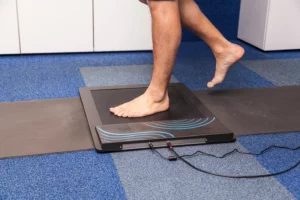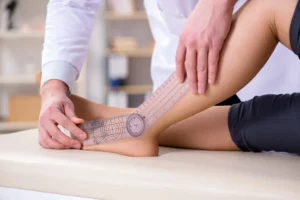Acupuncture is a form of alternative medicine that involves inserting thin, sterile needles into specific points on the body. It is based on the principles of traditional Chinese medicine, which posits that the body has a vital energy called “Qi” or “Chi” that flows through pathways or “meridians”. According to traditional Chinese medicine theory, illness and pain result from disruptions or imbalances in the flow of Qi.
Acupuncture is thought to stimulate the body’s natural healing processes by restoring the flow of Qi. The needles are typically left in place for 15 to 30 minutes, during which time the patient may feel a tingling or dull ache sensation.
Acupuncture is commonly used to treat a wide range of conditions, including:
- Pain: Acupuncture is particularly effective for treating chronic pain conditions, such as back pain, neck pain, and osteoarthritis (which we at All Out Physiotherapy can help with)
- Headaches and migraines: Acupuncture may help reduce the frequency and severity of headaches and migraines (which we are able to help with)
Acupuncture is generally considered safe when performed by a trained and licensed practitioner using sterile needles. It is often used in conjunction with other forms of conventional or complementary medicine to optimise treatment outcomes.
Acupuncture is commonly used to manage pain and has been shown to be effective for a wide range of acute and chronic pain conditions. Some of the benefits of acupuncture in managing pain include:
- Reduced pain intensity: Acupuncture can help reduce the intensity and frequency of pain by stimulating the body’s natural pain-relieving mechanisms. It can also help reduce the need for pain medication, which can have negative side effects. Acupuncture has been shown to help reduce pain by promoting the release of natural pain-relieving chemicals in the body, such as endorphins and enkephalins. When used in combination with physiotherapy, acupuncture can help relieve pain in the affected area, making it easier for patients to do their rehab program.
- Improved function: By reducing pain and improving mobility, acupuncture can help individuals regain function and improve their quality of life. This can be particularly important for individuals with chronic pain conditions that impact daily activities.
- Improved sleep: Pain can often disrupt sleep, leading to a cycle of pain and fatigue. Acupuncture has been shown to help improve sleep quality and duration, which can further support pain management.
- Reduced inflammation: Acupuncture may help reduce inflammation, which can contribute to pain and other health issues. This is particularly relevant for conditions such as arthritis and other inflammatory disorders. Acupuncture can help reduce inflammation in the affected area by promoting the release of anti-inflammatory chemicals, such as cortisol and interleukin-10. This can help speed up the healing process and reduce the risk of chronic pain.
- Improved muscle function: Acupuncture can help improve muscle function by increasing blood flow to the affected area and promoting the release of neurotransmitters that stimulate muscle activity. This can be particularly helpful in the treatment of conditions such as muscle strains and sprains.
- Reduced muscle spasms: Acupuncture can help reduce muscle spasms by relaxing the affected muscles and promoting the release of natural muscle relaxants. This can help patients regain mobility and function more quickly.
- Enhanced overall well-being: Acupuncture has been shown to have a calming effect on the body, which can help reduce stress and anxiety levels in patients undergoing physiotherapy. This can help improve overall well-being and make it easier for patients to cope with the demands of their rehabilitation program.
- Improved mental health: Chronic pain can have a significant impact on mental health, leading to anxiety, depression, and stress. Acupuncture may help improve mental health by reducing pain and promoting relaxation.
- Fewer side effects: Acupuncture is generally considered safe and has fewer side effects compared to many pain medications. This makes it a viable option for individuals who cannot tolerate or do not want to take medication.
Overall, acupuncture can be a safe and effective treatment option for managing pain, especially when used in conjunction with other conventional or complementary therapies. It is important to consult with a licensed acupuncturist or healthcare professional to determine if acupuncture is appropriate for your specific pain condition.


